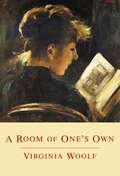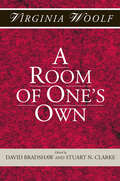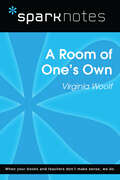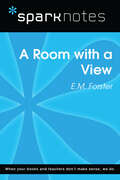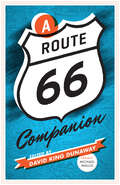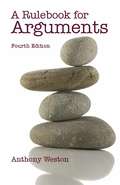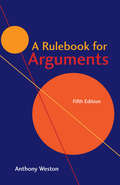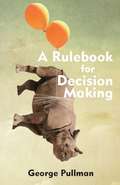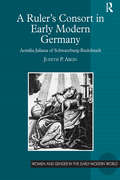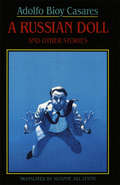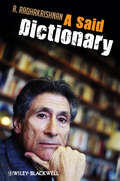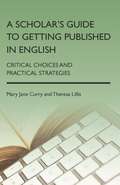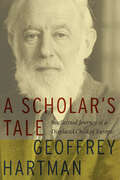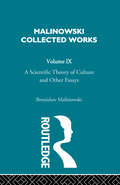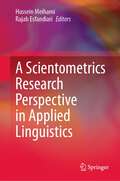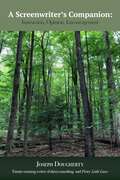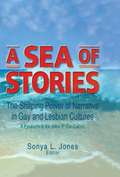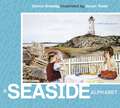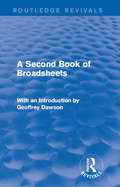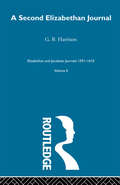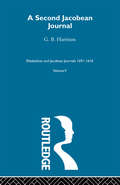- Table View
- List View
A Room of One's Own (Penguin Classics)
by Virginia WoolfA Room of One's Own is an essay based on a series of lectures Virginia Woolf delivered at Cambridge University in 1928. The argument she makes in this pioneering work of feminism is that in order to excel as artists women writers require both a literal and a figurative space they can claim as their own.
A Room of One's Own (Shakespeare Head Press Edition of Virginia Woolf)
by Virginia WoolfA Room of One’s Own, is one of Virginia Woolf’s most influential works and is widely recognized for its extraordinary contribution to the women’s movement. This timely and important new edition adopts the complete text of the first British edition published in 1929. Features a comprehensive introduction detailing the process and composition of Woolf’s original essay and the evolution of its subsequent publication history The first comprehensive and authoritative edition of this foundational text of the feminist movement, and one of the most significant works in Woolf’s own canon The only volume based on comparisons of each of the British editions of A Room of One’s Own that appeared in Woolf’s lifetime Incorporates extensive explanatory notes which reveal the essay’s broader political, historical, social, and literary contexts Includes a comprehensive appendix highlighting variations between each of the British editions that appeared in Woolf’s lifetime and the first American edition; alterations from Woolf’s uncorrected proofs; and current editorial emendations incorporated in this new edition
A Room of One's Own (SparkNotes Literature Guide Series)
by SparkNotesA Room of One's Own (SparkNotes Literature Guide) by Virginia Woolf Making the reading experience fun! Created by Harvard students for students everywhere, SparkNotes is a new breed of study guide: smarter, better, faster. Geared to what today's students need to know, SparkNotes provides: *Chapter-by-chapter analysis *Explanations of key themes, motifs, and symbols *A review quiz and essay topicsLively and accessible, these guides are perfect for late-night studying and writing papers
A Room with a View (SparkNotes Literature Guide Series)
by SparkNotesA Room with a View (SparkNotes Literature Guide) by E. M. Forster Making the reading experience fun! Created by Harvard students for students everywhere, SparkNotes is a new breed of study guide: smarter, better, faster.Geared to what today's students need to know, SparkNotes provides:*Chapter-by-chapter analysis *Explanations of key themes, motifs, and symbols *A review quiz and essay topicsLively and accessible, these guides are perfect for late-night studying and writing papers
A Route 66 Companion
by David King DunawayA literary history of America&’s most storied highway, featuring work from Raymond Chandler, Joan Didion, John Steinback, Sylvia Plath, and more.Even before there was a road, there was a route. Buffalo trails, Indian paths, the old Santa Fe trace—all led across the Great Plains and the western mountains to the golden oasis of California. America&’s insatiable westering urge culminated in Route 66, the highway that ran from Chicago to Los Angeles. Opened in 1926, Route 66 became the quintessential American road. It offered the chance for freedom and a better life, whether you were down-and-out Okies fleeing the Dust Bowl in the 1930s or cool guys cruising in a Corvette in the 1960s. Even though the interstates long ago turned Route 66 into a by lane, it still draws travelers from around the world who long to experience the freedom of the open road.A Route 66 Companion gathers fiction, poetry, memoir, and oral history to present a literary historical portrait of America&’s most storied highway. From accounts of pioneering trips across the western plains to a sci-fi fantasy of traveling Route 66 in a rocket, here are stories that explore the mystique of the open road, told by master storytellers ranging from Washington Irving to Raymond Chandler, Joan Didion, Sylvia Plath, Leslie Marmon Silko, and John Steinbeck. Interspersed among them are reminiscences that, for the first time, honor the varied cultures—Native American, Mexican American, and African American, as well as Anglo—whose experiences run through the Route 66 story like the stripe down the highway. So put the top down, set the cruise control, and &“make that California trip&” with A Route 66 Companion.&“Route 66 has a long and interesting history, and Dunaway . . . has done a fantastic job selecting works of literature about &‘America&’s Main Street&’ to tell its dynamic story, supplemented by the editor&’s own invaluable commentary. . . . [An]all-around remarkable anthology.&” —Publishers Weekly&“A Route 66 Companion is a great read and should find its way to the hands of any armchair traveler or lover of the history of the American West.&” —Oral History Review
A Rulebook for Arguments
by Anthony WestonA Rulebook for Arguments is a succinct introduction to the art of writing and assessing arguments, organized around specific rules, each illustrated and explained soundly but briefly. This widely popular primer--translated into eight languages--remains the first choice in all disciplines for writers who seek straightforward guidance about how to assess arguments and how to cogently construct them.The fourth edition offers a revamped and more tightly focused approach to extended arguments, a new chapter on oral arguments, and updated examples and topics throughout.
A Rulebook for Arguments
by Anthony WestonFrom academic writing to personal and public discourse, the need for good arguments and better ways of arguing is greater than ever before. This timely fifth edition of A Rulebook for Arguments sharpens an already-classic text, adding updated examples and a new chapter on public debates that provides rules for the etiquette and ethics of sound public dialogue as well as clear and sound thinking in general.
A Rulebook for Decision Making
by George Pullman"Pullman offers his readers essential insights into how humans reason and make decisions. Both concise and far-reaching, his work teaches us how to challenge intuitive logic and examine the processes for deliberative reasoning. This text will prove foundational for students in their intellectual journey toward the development of real skills in critical thinking. By pointing to simple yet profound examples, Pullman's text is both readable and provocative as it challenges us to consider the very mechanisms by which we understand our own cognitive biases." --Bradley A. Hammer, Department of English and Comparative Literature, University of North Carolina, Chapel Hill
A Ruler’s Consort in Early Modern Germany: Aemilia Juliana of Schwarzburg-Rudolstadt (Women and Gender in the Early Modern World)
by Judith P. AikinThe wives of rulers in early modern Europe did far more than provide heirs for their principalities and adornment for their courts. In this study, Judith Aikin examines the exceptionally well-documented actions of one such woman, Aemilia Juliana of Schwarzburg-Rudolstadt (1637-1706), in order to expand our understanding of the role of ruler’s consort in the small principalities characteristic of Germany during this period. Aikin explores a wide range of writings by her subject, including informal letters to another woman, hundreds of devotional song texts, manuscript books both devotional and practical, and published pamphlets and books. Also important for this study are the plays, paintings, and musical works that adorned the court under Aemilia Juliana’s patronage; the books, poems, and sermons published in her honor; and the massive memorial volume printed and distributed soon after her death. This material, when coupled with the more scanty record in official documents, reveals the nature and scope of Aemilia Juliana’s role as full partner in the ruling couple. Among the most important findings based on this evidence are those related to Aemilia Juliana’s advocacy for women of all social classes through her authorship and publications, her support for the education of girls, her efforts to ameliorate the fear and suffering of pregnant and birthing women, and her contributions to female support networks. In examining the career of a consort whose various activities are so well documented, this study helps to fill in the blanks in the documentary record of numerous consorts across early modern Europe, and serves as a model for future research on other consorts at other courts.
A Ruler’s Consort in Early Modern Germany: Aemilia Juliana of Schwarzburg-Rudolstadt (Women and Gender in the Early Modern World)
by Judith P. AikinThe wives of rulers in early modern Europe did far more than provide heirs for their principalities and adornment for their courts. In this study, Judith Aikin examines the exceptionally well-documented actions of one such woman, Aemilia Juliana of Schwarzburg-Rudolstadt (1637-1706), in order to expand our understanding of the role of ruler’s consort in the small principalities characteristic of Germany during this period. Aikin explores a wide range of writings by her subject, including informal letters to another woman, hundreds of devotional song texts, manuscript books both devotional and practical, and published pamphlets and books. Also important for this study are the plays, paintings, and musical works that adorned the court under Aemilia Juliana’s patronage; the books, poems, and sermons published in her honor; and the massive memorial volume printed and distributed soon after her death. This material, when coupled with the more scanty record in official documents, reveals the nature and scope of Aemilia Juliana’s role as full partner in the ruling couple. Among the most important findings based on this evidence are those related to Aemilia Juliana’s advocacy for women of all social classes through her authorship and publications, her support for the education of girls, her efforts to ameliorate the fear and suffering of pregnant and birthing women, and her contributions to female support networks. In examining the career of a consort whose various activities are so well documented, this study helps to fill in the blanks in the documentary record of numerous consorts across early modern Europe, and serves as a model for future research on other consorts at other courts.
A Russian Doll & Other Stories
by Adolfo Bioy Casares Suzanne Jill LevineThis collection of traditional and experimental stories by Argentinian novelist Bioy Casares ( The Adventures of a Photographer in La Plata ) offers sophisticated, seamless prose, as well as magical realism and biting political satire. - Publishers Weekly A Russian Doll and Other Stories is the ninth collection of short fiction by one of this century's premier Argentinian writers who, with his fellow countrymen Julio Cortázar and Jorge Luis Borges, helped change the world's perception of Latin American literature. Bioy Casares's narratives are elegant and urbane, his style precise and streamlined, as he paces his characters through seriocomic traps of fate--ensnared by love, impelled by lust, ambition, or plain greed, even metamorphosed by pharmaceuticals. These are not stories in a psychological mode but like the image of the Russian doll of the title piece are carefully wrought congeries of intractable selves within selves.
A Said Dictionary
by R. RadhakrishnanThis interpretive dictionary introduces the critical and theoretical world of distinguished literary and cultural critic Edward W. Said through the crucial terms and concepts central to his work. Compares and contrasts Said's perspective with other key theorists, such as Derrida, Spivak, Foucault, and Jameson Describes the crucial terms and concepts central to Said's work Places the development of Said's work within its historical context
A Scholar's Guide to Getting Published in English
by Mary Jane Curry Theresa LillisIn many locations around the globe, scholars are coming under increasing pressure to publish in English in addition to other languages. However research has shown that proficiency in English is not always the key to success in English-medium publishing. This guide aims to help scholars explore the larger social practices, politics, networks and resources involved in academic publishing and to encourage scholars to consider how they wish to take part in these practices-as well as to engage in current debates about them. Based on 10 years of research in academic writing and publishing practices, this guide will be invaluable both to individuals looking for information and support in publishing, and to those working to support others' publishing activities.
A Scholar's Tale: Intellectual Journey of a Displaced Child of Europe
by Geoffrey HartmanFor more than fifty years, Geoffrey Hartman has been a pivotal figure in the humanities. In his first book, in 1954, he helped establish the study of Romanticism as key to the problems of modernity. Later, his writings were crucial to the explosive developments in literary theory in the late seventies, and he was a pioneer in Jewish studies, trauma studies, and studies of the Holocaust. At Yale, he was a founder of its Judaic Studies program, as well as of the first major video archive for Holocaust testimonies.Generations of students have benefited from Hartman’s generosity, his penetrating and incisive questioning, the wizardry of his close reading, and his sense that the work of a literary scholar, no less than that of an artist, is a creative act. All these qualities shine forth in this intellectual memoir, which will stand as his autobiography. Hartman describes his early education, uncanny sense of vocation, and development as a literary scholar and cultural critic. He looks back at how his career was influenced by his experience, at the age of nine, of being a refugee from Nazi Germany in the Kindertransport. He spent the next six years at school in England, where he developed his love of English literature and the English countryside, before leaving to join his mother in America.Hartman treats us to a “biobibliography” of his engagements with the major trends in literary criticism. He covers the exciting period at Yale handled so controversially by the media and gives us vivid portraits, in particular, of Harold Bloom, Paul de Man, and Jacques Derrida.All this is set in the context of his gradual self-awareness of what scholarship implies and how his personal displacements strengthened his calling to mediate between European and American literary cultures. Anyone looking for a rich, intelligible account of the last half-century of combative literary studies will want to read Geoffrey Hartman’s unapologetic scholar’s tale.
A Scientific Theory of Culture and Other Essays: [1944]
by Bronislaw MalinowskiPublished, posthumously, this volume is both a summing up and a reformulation of Malinowski's functional theory of culture.
A Scientometrics Research Perspective in Applied Linguistics
by Hussein Meihami Rajab EsfandiariThis volume explains how scientometrics can be used in understanding the research studies in applied linguistics and will assist applied linguists to examine different aspects of the research performed in their field. The book covers a diachronic and synchronic empirical analysis of research practices, concepts, and phenomena in applied linguistics. It builds upon the ideas and experience of international researchers and provides the reader with creative methods to apply the scientometric principles in their applied research. Aimed at emerging applied linguistics researchers, researcher-practitioners, and MA and PhD students, this book provides a wealth of research ideas for further analysis, to strengthen the knowledge of the field, and to help digest research practices, research publications, research trends, research policies, and research methods. The book will also be useful for the well-established applied linguistics researchers who is interested in a reconceptualization of the field.
A Screenwriter's Companion: Instruction, Opinion, Encouragement
by Joseph DoughertyEveryone wants to write for television, and now there's a book that teaches you how to do it by an author who has not only done it himself, but has won multiple awards in the process. &“I was a writer before I knew what a writer was.&” -Joseph DoughertyJoseph Dougherty has been a successful playwright and television writer, producer, and director for more than thirty years. He&’s written for breakthrough series that have changed the way we look at television drama, from thirtysomething to Pretty Little Liars, winning everything from Emmys to Teen Choice Awards along the way. In A Screenwriter&’s Companion,Dougherty offers insights and advice both practical and nonpractical to writers and would-be writers. Dougherty&’s voice comes off the page with anecdotes about the writing process, hard-learned tips for survival in &“the business,&” and reflections on the influences that led him to a successful career. Honestly, entertainingly, without cynicism, he gives readers permission to embrace the writer they want to be, so they can experience the rewards and satisfactions of writing. Beyond an insider&’s take on story and structure, dialogue, action and outlining, A Screenwriter&’s Companionis as much mentor as it is manual. With every insider observation about how to keep a potential producer reading till the last page of a script, there&’s encouragement to explore your thoughts and memories, things a writer needs to embrace in order to become more than &“a pro.&” In short, to see writing not as merely a career, but as a way to greater self-understanding. With a Foreword by Scott Ryan (thirtysomething at thirty: an oral history). This book was selected by Foreword Magazine as one of the Best Gift Items of Fall 2022.
A Sea of Languages
by Suzanne Conklin Akbari Karla MalletteMedieval European literature was once thought to have been isolationist in its nature, but recent scholarship has revealed the ways in which Spanish and Italian authors - including Cervantes and Marco Polo - were influenced by Arabic poetry, music, and philosophy. A Sea of Languages brings together some of the most influential scholars working in Muslim-Christian-Jewish cultural communications today to discuss the convergence of the literary, social, and economic histories of the medieval Mediterranean.This volume takes as a starting point María Rosa Menocal's groundbreaking work The Arabic Role in Medieval Literary History, a major catalyst in the reconsideration of prevailing assumptions regarding the insularity of medieval European literature. Reframing ongoing debates within literary studies in dynamic new ways, A Sea of Languages will become a critical resource and reference point for a new generation of scholars and students on the intersection of Arabic and European literature.
A Sea of Stories: The Shaping Power of Narrative in Gay and Lesbian Cultures: A Festschrift for John P. DeCecco
by John Dececco, Phd Sonya L JonesTake a look at how narrative has shaped gay and lesbian cultureA Sea of Stories: The Shaping Power of Narrative in Gay and Lesbian Cultures: A Festschrift for John P. De Cecco is an unforgettable collection of personal narratives that explores the historical, psychological, and sociological contexts of homosexuality in locations ranging from Nazi Germany to Colorado. Some of the prominent authors in this collection include David Bergman, Louis Crew, Diana Hume George, and Ruth Vanita. Scholars in gay and lesbian studies, political movements, cultural studies, and narratology, and anyone interested in gay history will want to explore these intriguing narratives on topics such as sex and sin in the South, selling gay literature before Stonewall, growing up gay in India, and the story of an interracial male couple facing homophobic ignorance in a small town.A Sea of Stories also contains creative fiction and nonfiction love stories, war stories, oral stories, and bibliographies, and a beautiful post-Stonewell and post-modern narrative set on a South African seascape that tells the story of two professional men and the possibility of a kiss. For a complete list of contents, please visit our Web site at www.haworthpressinc.com.This book offers you a variety of narratives that cover a wide range, including: memoirs of gay Holocaust survivors and the emergence of the first lesbian and gay book club in its wake homophobia in the workplace and the use of coming-out stories to enhance workplace diversity the establishment of a gay/straight alliance in a Salt Lake City high school that is heavily dominated by Mormons gay literary heritage that examines the works of Langston Hughes as well as Martin Duberman, Paul Monette, and Edmund White in relation to the lesbian 70s creative nonfiction about a woman's love for another woman, her lifelong friend Provincetown's remarkable community response to the AIDS epidemicA collection of chapters written by the colleagues and former students of John P. De Cecco, pioneering editor of the Journal of Homosexuality, A Sea of Stories takes its title from a phrase Dr. De Cecco used in his keynote address to the “History and Memory” conference at Allegheny College in 1997. This conference sparked the idea for this collection of essays that examine the homosexual experience through historical, psychological, and sociological viewpoints and homosexuality in literature. These courageous stories will assist readers to know themselves more deeply, to identify wih others, and to interpret gay and lesbian experiences in different narrative forms.
A Seaside Alphabet (ABC Our Country)
by Donna GrassbyWhether it’s a treasure hunt on Jewell Island, Maine, a sunny afternoon on the rocks at Peggy’s Cove, Nova Scotia, or a dip in the ocean on Prince Edward Island, life by the sea is fun. This gloriously illustrated picture book is a celebration of all things coastal: humpback whales, teeming wildlife, and most of all, people who make their homes by the ocean. Seaside life is shown in twenty-six magnificent illustrations. The alliterative text and the detailed notes at the back make the book as informative as it is beautiful. For those lucky enough to have visited the coast, as well as those who only dream of the sea, this book is a feast for the eyes and for the spirit.
A Season of Change (Great Minds Wit & Wisdom #Grade 2, Module 1)
by Ann Brigham Lauren Chapalee Lorraine GriffithNIMAC-sourced textbook
A Season of Change: Assessment Pack (Great Minds Wit & Wisdom #Grade 2, Module 1)
by Ann Brigham Lauren Chapalee Lorraine GriffithNIMAC-sourced textbook
A Second Book of Broadsheets: With an Introduction by Geoffrey Dawson (Routledge Revivals: A Book of Broadsheets)
by VariousThis book, together with A Book of Broadsheets makes up an anthology of the 1915 broadsheets distributed by The Times to members of H.M. Forces serving in the trenches of World War I. The volume contains a wide variety of rich literature from before the war and was designed to give soldiers entertainment. It includes extracts from the works of Francis Bacon, Rudyard Kipling, Sir Walter Raleigh, William Wordsworth and Charles Dickens.
A Second Elizabethan Journl V2: Being A Record Of Those Things Most Talked Of During The Years 1591-1610 (Routledge Library Editions Ser.)
by G.B. HarrisonFirst Published in 1999. Routledge is an imprint of Taylor & Francis, an informa company.
A Second Jacobean Journal V5: Being A Record Of Those Things Most Talked Of During The Years 1591-1610 (Routledge Library Editions Ser.)
by G.B. HarrisonFirst Published in 1999. Routledge is an imprint of Taylor & Francis, an informa company.
